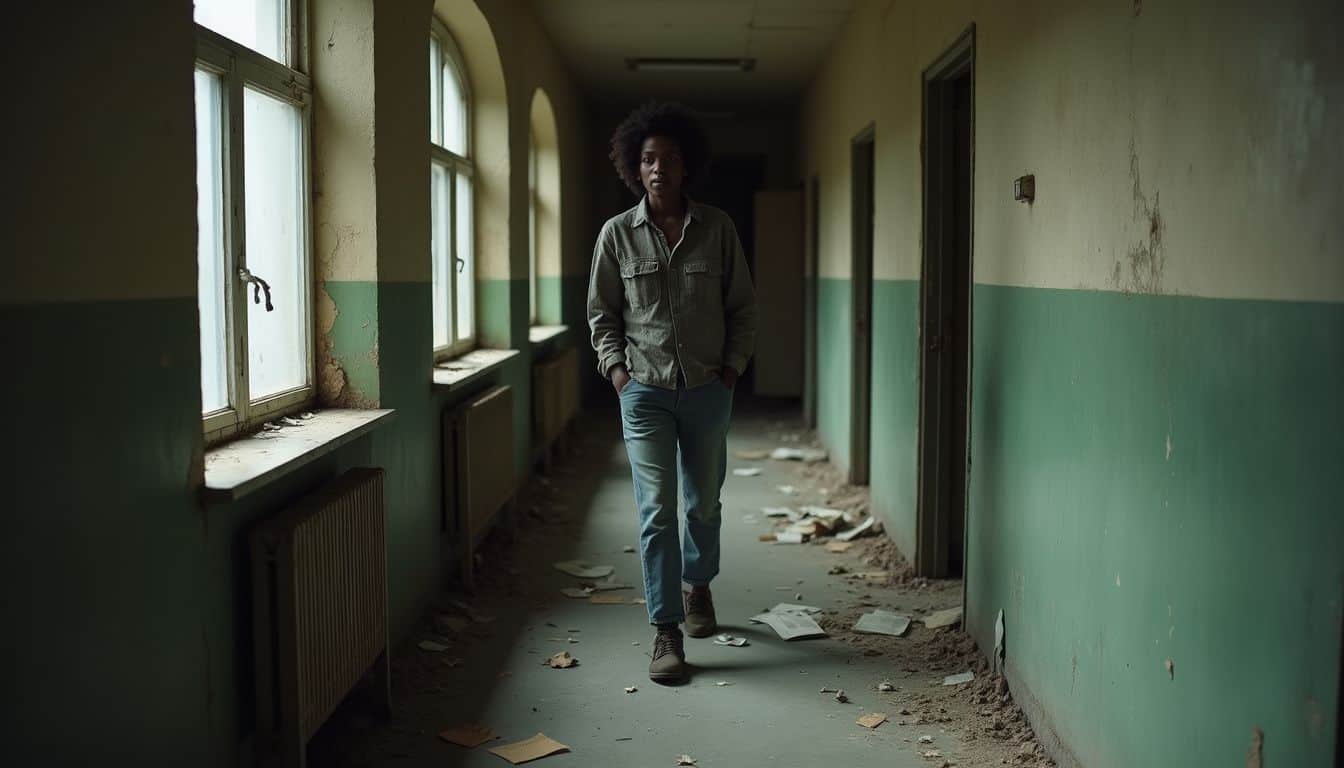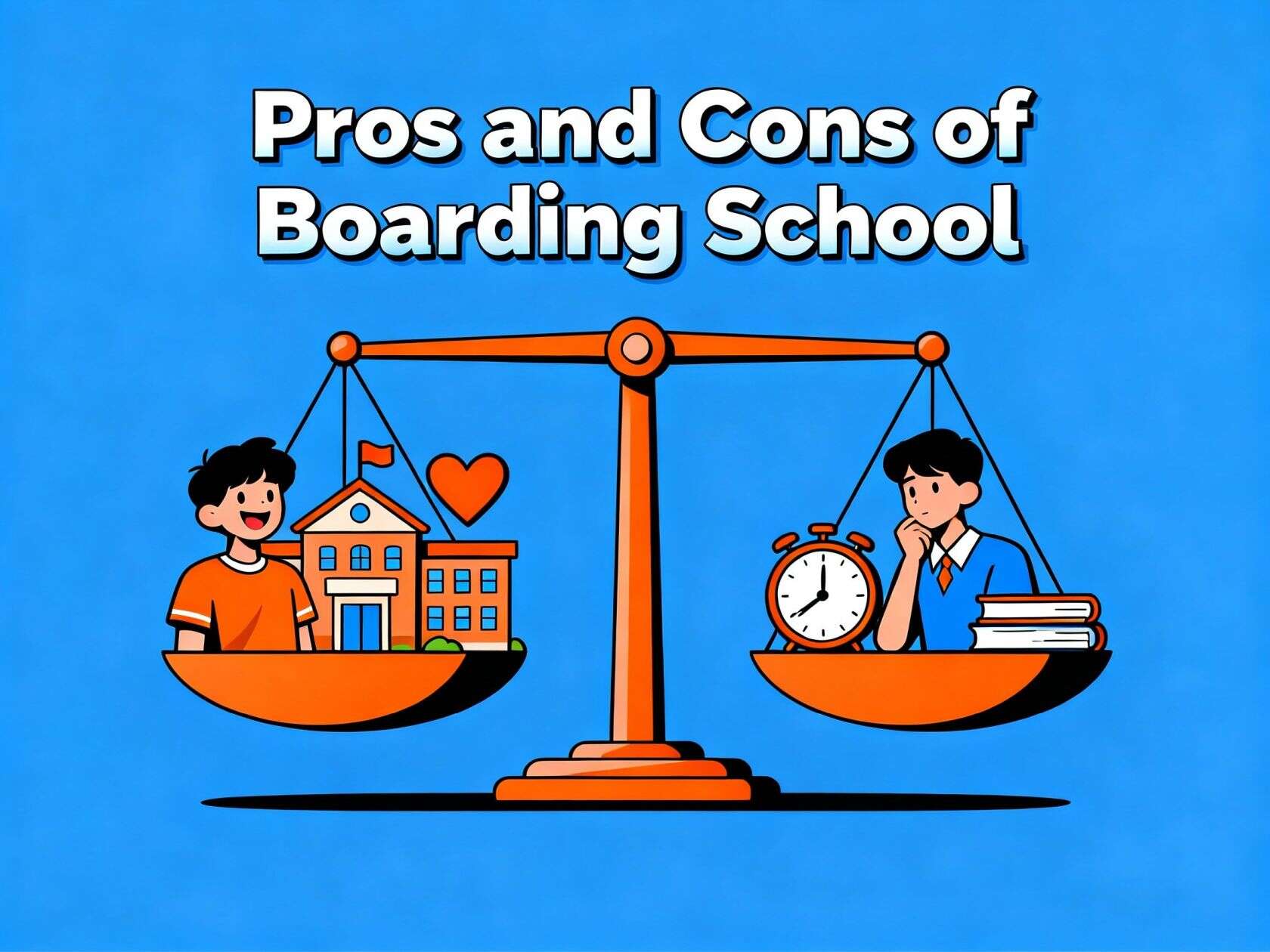Trying to pick the right school for your child can sometimes feel like you’re trying to solve a puzzle with a million pieces, can’t it?
So many of us wonder if a boarding school is the secret to unlocking better academic performance or helping our kids grow into more motivated, independent people.
But then, the worries creep in. You think about the cost, the distance, and the idea of not having them home every night, and it’s enough to cause a few sleepless nights.
I’m going to walk you through all the pros and cons of boarding schools, sharing what I’ve found in a simple, friendly way. Let’s figure out together if this is the right path for your family.
Key Takeaways
Top boarding schools often report that over 95% of graduates attend four-year colleges, thanks to strong academic programs, small class sizes (often as low as 5:1), and specialized courses. For example, 47.4% of UK private school students earned top grades in 2023, compared to just 22% in public schools.
The annual cost for boarding is significant, with elite U.S. schools ranging from $60,000 to over $80,000 per year. However, financial aid is becoming more common, with some academies offering free tuition to families earning under certain amounts.
Students develop independence by managing their own schedules and responsibilities. They also gain exposure to a diverse learning environment, with schools like Branksome Hall hosting students from over 60 countries.
Emotional drawbacks are real and include homesickness and the risk of “boarding school syndrome,” which can lead to difficulty forming relationships. To counter this, schools are increasing mental health support and offering flexible boarding options.
The pressure to succeed is intense, both academically and socially. This, combined with reduced daily family time, can impact a child’s emotional health, a point that requires serious consideration from families.
Pros of Boarding School

Boarding schools create a unique world where kids are surrounded by different cultures and ways of learning. With mentors helping them find their passions, students can explore everything from competitive sports to advanced science labs.
Strong academic results
One of the biggest draws for many parents is the promise of a top-notch education, and the numbers often back this up.
The academic edge isn’t just in the U.S. In the UK, 47.4% of private school students achieved top A or A* grades in 2023, more than double the 22% of students in public schools who did the same. At elite schools like Phillips Academy, the student-to-faculty ratio is a remarkable 5-to-1, ensuring personalized attention.
This intensive environment can lead to significant cognitive development. Some schools offer truly unique programs, like the Kohler Environmental Center at Choate Rosemary Hall, where students can conduct year-long environmental research in professional-grade labs.
A good teacher can inspire hope, ignite the imagination, and instill a love of learning. — Brad Henry
Development of independence and responsibility
Daily life at a boarding school is a crash course in self-reliance. From managing laundry to balancing study time with extracurriculars, students learn to take charge of their own lives.
I’ve seen this firsthand with a friend’s daughter who learned essential life skills far more quickly than she might have at home. She was soon managing her schedule, budget for school supplies, and coordinating with dorm mates, all without daily reminders from her parents.
This independence is nurtured by the school’s structure. Students are encouraged to take on leadership roles in everything from student-led clubs to dorm government. At places like Ridley College or Lakefield College School, these opportunities are woven into the fabric of daily life, whether through the international baccalaureate program or community service projects.
This environment is designed to build a strong growth mindset and resilience, preparing students not just for college but for life.
Exposure to diverse cultures and perspectives
Boarding schools are often a melting pot of cultures, attracting students from all over the world. In 2025, it’s common for international students to make up a significant portion of the student body, sometimes over 15% in American schools and even higher in the UK.
At schools like Ashbury College or Upper Canada College, your child could be sharing a dorm room or a lab table with peers from Asia, Europe, or South America. These daily interactions build a level of empathy and understanding that a textbook simply can’t provide.
This global perspective is often built right into the curriculum. Some schools, like The Thacher School, partner with universities like Caltech for guided research projects. This kind of collaboration teaches students to work with people from different backgrounds and points of view.
Living and learning with peers from different religious, linguistic, and cultural backgrounds helps develop open-mindedness, curiosity, and confidence, which are invaluable skills for the future.
Access to extensive extracurricular activities
The learning at boarding school doesn’t stop when the school bell rings. The afternoons, evenings, and weekends are often packed with incredible opportunities for hands-on learning and personal growth.
Just look at what’s offered:
- In some schools, students can get involved in everything from brain research and genetics labs to astronomy and geology fieldwork.
- Schools like The Webb Schools in California are home to the Raymond M. Alf Museum of Paleontology, the only accredited paleontology museum on a high school campus in the country.
- For aspiring artists, a school like Interlochen Arts Academy in Michigan offers pre-professional training in music, dance, and visual arts with facilities that rival universities.
- At IMG Academy in Florida, student-athletes have access to professional-grade training facilities to pursue their athletic dreams.
These extracurricular activities are more than just hobbies, they help students build character, develop teamwork skills, and discover new passions.
“Every day holds something new after school,” one alum shared, “whether it’s fencing practice or designing in the robotics lab.”
Lifelong friendships and networking opportunities
There’s a special kind of bond that forms when you live with your friends. The late-night study sessions, shared meals, and weekend activities at boarding school create friendships that are often deeper and more enduring than those made in a traditional school setting.
Many alumni say their closest friends are the ones they made in the dorms. As one former student shared on Reddit, you’re always with your best friends, experiencing everything together, which creates an incredibly strong support system. This shared experience builds a powerful sense of community and belonging.
This network doesn’t end at graduation. The alumni network from a boarding school can be an incredible resource for career advice, job opportunities, and connections in various industries. You never know when a former classmate from a place like King’s-Edgehill School might become a key professional contact down the road.
These lifelong friendships and the powerful network they create are some of the most valuable, long-term benefits of the boarding school experience.
Cons of Boarding School

High cost of education
There’s no getting around it, the cost of boarding school is a major hurdle for most families. In 2025, tuition at elite U.S. boarding schools can range from $60,000 to over $80,000 a year. According to the National Association of Independent Schools, the average for a 7-day boarding program is around $69,150.
And that’s just the sticker price.
You also have to factor in extra expenses for things like travel home for holidays, school uniforms, sports equipment, and activity fees. These can easily add thousands more to the annual bill.
The good news is that limited financial aid is becoming less of a barrier. A growing number of top schools are committed to making education more accessible. At many selective schools, between 34% and 44% of students receive some form of financial aid.
Homesickness and emotional challenges
The financial cost is one thing, but the emotional cost can be just as significant. Homesickness is a very real and common experience for students, especially during the first few months away from home.
For some kids, especially those who are younger or have a strong need for daily parental involvement, this separation can cause real developmental strain. Living away from home means missing out on family dinners, bedtime chats, and the simple comfort of being in a familiar place. This can lead to feelings of loneliness and isolation, even in a busy school environment.
When researching schools, it’s essential to thoroughly investigate their safety protocols and student welfare policies. While most institutions maintain high standards, parents should be aware of historical issues related to boarding school abuse and ensure prospective schools have transparent safeguarding measures, regular oversight, and clear reporting procedures in place to protect students.
Limited family time
When your child is at boarding school, you naturally see them less. Most of the academic year is spent on campus, which means missing out on the small, everyday moments that make up family life.
My niece only came home every few weekends and often felt disconnected from family birthdays and holidays. While schools encourage video calls and have designated family weekends, it’s not quite the same as a shared meal or a hug at the end of a long day.
This reduced contact can be hard on both parents and children and can affect a child’s sense of belonging. It’s a significant trade-off to consider, especially for younger children or those who are very close to their families. Before choosing this path, it’s worth having a frank conversation about how your family will handle the distance.
Pressure to succeed academically and socially
The environment at many boarding schools is intense. With rigorous academic standards and a community of high-achieving peers, the pressure to perform can be enormous.
Students have packed schedules, moving from classes to sports to clubs from morning until night. There is often a strong sense of peer competition, not just for grades but also for leadership positions in clubs or on sports teams. I remember a friend telling me her son lost a lot of sleep over exams because everyone was constantly comparing their scores.
This constant social pressure can be stressful and may lead to burnout if not managed well. While schools are focusing more on student wellness, it’s important to consider if your child will thrive in such a competitive atmosphere. It’s a world where smart study habits and time management are essential for survival.
Risk of “boarding school syndrome”
Some therapists have identified a condition they call “boarding school syndrome” to describe the long-term emotional struggles some people face after being separated from their families at a young age. Symptoms can include depression, difficulty expressing emotions, and challenges in forming close relationships later in life.
Public figures have brought more attention to this issue. Charles Spencer, Princess Diana’s brother, has spoken about the emotional isolation and lifelong trauma he experienced at his boarding school in the 1970s.
Research from the University of Suffolk has shown that a child’s ability to communicate their feelings and their closeness with their family are important factors in how well they adjust. While schools are making reforms, the historical impact of these issues is still a concern.
How to Determine if Boarding School is Right for Your Child

Figuring out if boarding school is the right choice is a big decision. A great way to start is by visiting schools during an open house, where you can talk to real families and get a feel for the community.
Assess your child’s personality and needs
The most important question is whether this environment fits your child. Some kids thrive on the community immersion and structure that boarding school offers, while others really need the daily comfort of family to flourish.
Think about these questions:
- Is your child independent and self-motivated?
- Do they enjoy being part of a team or group?
- How do they handle being away from home at sleepovers or summer camp?
- Are they showing genuine interest and excitement about the idea?
Emotional resilience is just as important as academic ability. My niece was excited at first but struggled with homesickness her first year away. Many parents suggest that waiting until a child is at least 13 can make a big difference in their ability to adapt. Forcing an unwilling child into this environment rarely ends well, no matter how great the school looks on paper.
Consider your family’s financial situation
The financial commitment is substantial, so it’s essential to have a clear picture of what you can afford. With annual fees often topping $70,000, you need to budget for tuition as well as extra costs like travel, uniforms, and supplies.
It’s worth spending time researching financial aid options. Many schools offer need-based aid, and organizations like The Howley Foundation provide scholarships to help families manage the cost. Nearly 40-45% of boarding school students receive some form of financial assistance, so don’t rule it out based on the sticker price alone.
Think about this as a long-term investment. While it might mean making sacrifices in other areas, the potential payoff in terms of college acceptances and future opportunities could be significant.
Review the school’s facilities and programs
Once you have a shortlist, nothing beats visiting the campus in person. A tour gives you a feel for the school’s culture that you can’t get from a brochure.
When you visit, pay attention to the little things:
- The Dining Hall: Eat a meal there if you can. What’s the vibe? Is the food decent?
- The Dorms: Look at the common spaces. Do students seem comfortable and happy? Are the rooms well-maintained?
- The Classrooms: Are students engaged? How do teachers interact with them?
Ask questions that go beyond the brochure, like “What is the school working to improve right now?” or “How does the school support students who are feeling homesick?” This is your chance to see if the school’s values align with your own.
Speak with current students and alumni
The best way to get an honest inside look is to talk to the people who live it every day. If you can, chat with current students and alumni during your visit.
Ask them about the things that really matter, like the homework load, the quality of the food, and what they do for fun on weekends. Students can give you the unfiltered truth about everything from roommate issues to which teachers are the most inspiring. Websites like Niche and Boarding School Review can also be great resources for student and parent testimonials.
Alumni can also provide valuable insight into how the school prepared them for college and their careers. A quick conversation can often tell you more about a school’s culture and support systems than any marketing material ever could.
How Will Boarding School Change in 2025?

Boarding schools are evolving to meet the needs of modern families. In 2025, you’ll see more five-day, weekly, and flexible boarding models, which allow for more family time on weekends. Schools are also working to become more inclusive, with expanded scholarships and financial aid programs.
There’s a much greater focus on mental health and wellness support. Many schools are hiring more counselors, integrating wellness programs into the curriculum, and creating digital moderation policies to help students unplug and get better sleep. For example, St. Edward’s School in Oxford reintroduced landline phones in dorms to encourage more face-to-face interaction.
You’ll also see more global exchange programs and hybrid classes that allow students to collaborate with peers from around the world. The goal of a comprehensive education is now about supporting the whole student, from their academic growth to their emotional well-being.
People Also Ask
What is holistic education in a boarding school setting?
It’s an approach where your child’s growth goes beyond academics by developing real-world skills like time management and self-advocacy in a 24/7 learning community. This focus is why a study by The Association of Boarding Schools found 78% of students felt exceptionally prepared for the independence of college life.
Are there downsides to living away from home for school?
Yes, homesickness is a real challenge initially, and the constant social environment can feel intense for some kids. Most schools have strong support systems, like peer mentoring programs, and students find that building deep friendships helps them adjust quickly.
How does boarding school support personal growth?
By giving students real responsibilities, from managing their own schedules to taking on leadership roles like dorm prefect, they build genuine resilience and self-discipline.
Can holistic education at a boarding school prepare my child for the future?
Yes, it helps them develop the independence and problem-solving skills needed for college by teaching them to navigate challenges on their own. Studies show boarding school graduates are more likely to earn advanced degrees and feel better prepared for university workloads.
References
https://pmc.ncbi.nlm.nih.gov/articles/PMC11007147/
https://www.crawfordinternational.co.za/the-advantages-and-disadvantages-of-boarding-schools (2024-09-13)
https://www.ourkids.net/school/pros-cons-boarding-school
https://www.boardingschoolreview.com/blog/boarding-school-pros-and-cons-history-and-common-misconceptions (2025-02-11)
https://www.boardingschoolreview.com/blog/boarding-school-pros-cons-history-myths-2025-insights (2025-10-11)
https://www.21kschool.com/us/blog/pros-and-cons-of-boarding-school/
https://www.boardingschoolreview.com/blog/boarding-school-pros-and-cons-2025 (2025-09-21)
